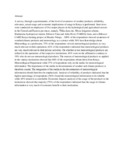| dc.description.abstract | A survey, through a questionnaire, of the level of awareness of weather products, reliability, relevance, actual usage and economic implications of usage in Kenya is performed. Interviews were conducted on employees of five major players in the hydrological and agricultural sectors in the Central and Eastern provinces, namely. Thika dam site, Mwea irrigation scheme, Kindaruma hydropower station, Kibwezi Tana and Athis River (TARDA) farm, and a Kibwezi CARE Kenya farming project at Masaku Ndogo. . 100% of the respondents showed awareness of weather/climate products and meteorology as a science while 56% have knowledge about Meteorology as a profession. 75% of the respondents viewed meteorological products as very much relevant in their operations. 62% of the respondents indicated that meteorological products are very much relevant in their private activities. On whether or not meteorological products are utilized in the operations of the respective institutions, 81% were on the affirmative contrary to 19% who do not use meteorological products. The sources of meteorological products as applied in the various institutions showed that 44% of the respondents obtain them from Kenya Meteorological Department while 37% of respondents rely on the media for meteorological information. The importance of the media in dissemination of weather and climate products is therefore crucial. The integration of the media in the dissemination of meteorological information should therefore be emphasized. Analysis of reliability of products indicated that the highest percentage of respondents (56%) found the meteorological information to be reliable while 44% termed it as unreliable. Economic Impacts analysis of the usage of the products to the institutions showed that majority (75%) of the respondents indicated that the usage of climate information is very much of economic benefit to their institutions | |

